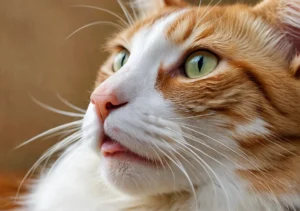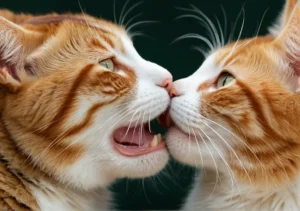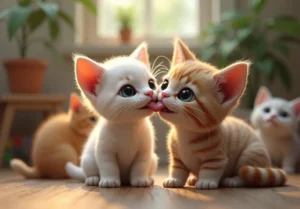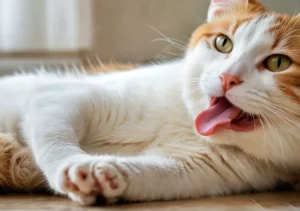Have you ever caught a whiff of your cat and wondered why they smell so delightful? It’s a head-scratcher that many cat owners encounter, but there’s definitely a reason behind that pleasant aroma.
Cats often smell good due to their grooming habits, which include licking their fur and spreading natural oils that help maintain a fresh scent. Their diets and environmental factors also play a significant role in their overall aroma. But the good news is there’s more to discover about your kitty’s delightful scent, so keep reading to uncover some fascinating insights!
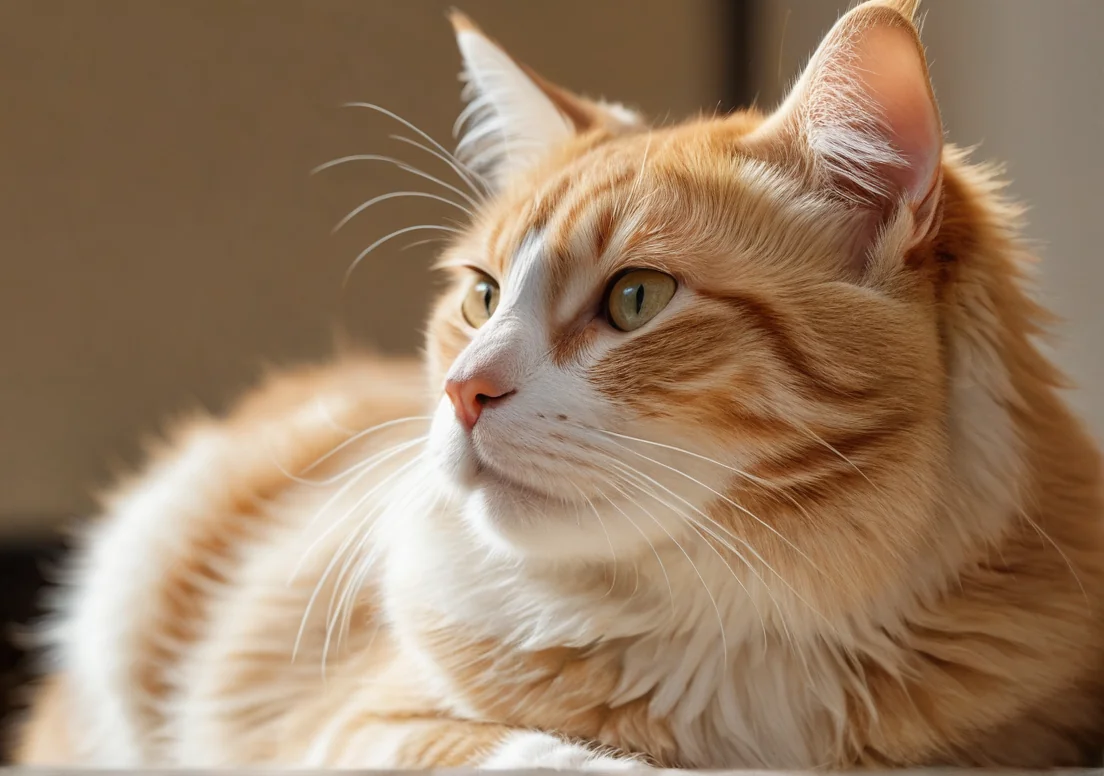
What Makes Cats Smell Good
Cats often have a naturally pleasant aroma, which can be attributed to several factors. One significant contributor is the skin oils they produce, also known as sebum. These oils act as a barrier for their skin and fur while providing a unique scent that many find delightful. The composition of these oils can vary from cat to cat, influenced by genetics and diet, giving your feline friend their own distinct smell.
Additionally, the pH balance of a cat’s skin plays a crucial role. It’s slightly acidic, which helps create an environment that supports beneficial bacteria. These bacteria contribute to an overall fresh scent rather than a pungent one you might expect from other animals. You might also notice a sweet smell from their fur due to grooming habits – after all, a clean cat is a happy cat!
What’s more, cats have a well-developed sense of smell that guides them in selecting safe, familiar, and pleasant scents. They often seek out herbs like catnip that can add an extra layer of goodness to their scent profile.
How Do Grooming Habits Affect Scent
Grooming is a cat’s way of life, and it greatly influences their lovely scent. Cats spend a significant portion of their day licking their fur, which doesn’t just keep them clean—it also distributes those natural oils evenly. By stimulating the sebaceous glands, they ensure their coat remains shiny and aromatic.
In addition to promoting oil distribution, grooming helps remove dirt, loose fur, and any stray odors that might cling to their coat. Friction from licking also serves to exfoliate their skin, preventing buildup that could lead to undesirable smells.
Here are some specific ways grooming habits can enhance a cat’s scent:
- Oil Distribution: Evenly spreads natural oils, contributing to a soft and pleasant smell.
- Dirt Removal: Eliminates any dirt or debris that could cause bad odors.
- Temperature Regulation: Helps keep their body temperature stable, leading to less sweating and odor production.
- Stress Relief: Grooming can ease anxiety, causing cats to release fewer stress-related odors.
An interesting angle is how diet can also affect the scent of a cat’s fur. High-quality, balanced nutrition can lead not only to better overall health but also to a more pleasant scent. Foods rich in omega fatty acids, such as fish-based diets, can improve their coat’s quality and aroma. A well-informed cat owner should always consider the dietary components that could contribute to their pet’s scent.
What Role Do Diet and Nutrition Play
The scent of your cat is closely tied to their diet and nutrition. Just like with us, what your cat eats can considerably impact how they smell. A high-quality, balanced diet rich in essential nutrients not only promotes overall health but can also enhance your feline’s natural aroma.
Protein sources are particularly crucial. Cats are obligate carnivores, meaning their diet should primarily consist of animal proteins. Foods that are well-balanced and contain high-quality ingredients (think real meats over fillers like corn or wheat) can help promote a fresh scent. Moreover, certain fatty acids found in fish oil can improve skin and coat health, which in turn can influence odor.
Additionally, keep in mind that some ingredients can lead to digestive issues. If your cat’s stomach is upset or they’re suffering from allergies, it could affect their scent. Regularly monitor their weight, coat luster, and overall wellbeing. If you spot any changes, it might be time to evaluate their food or consult your vet.
Lastly, don’t forget about hydration. Cats that drink enough water are less likely to have body odor, so encourage them to drink plenty, either through fresh water bowls or wet food options.
Can Stress Impact a Cat’s Smell
Stress isn’t just an emotional experience for cats; it can affect their physical state, including their natural aroma. A cat stressed about changes in their environment, such as moving to a new home or the arrival of a new pet, may exhibit changes in their body chemistry. Increased stress hormones can lead to alterations in sweat and oil secretions, which can create an unpleasant odor.
Don’t forget that certain signs can indicate stress in your feline friend:
- Hiding more than usual
- Changes in eating habits
- Aggression or withdrawal behaviors
- Litter box issues
To help alleviate stress, consider these techniques:
- Create a calming space: A quiet and comfortable area can provide solace.
- Interactive play: Engaging in regular playtime can reduce anxiety and tension.
- Pheromone diffusers: Products like Feliway can create a comforting environment.
Understanding your cat’s emotional state is just as crucial as maintaining their physical health. If you notice changes in their scent along with these stress signs, it may be worthwhile to explore ways to create a more relaxing environment for them.
Are Certain Breeds More Fragrant
Some cat breeds naturally carry a more pleasant scent than others due to their unique coat types and grooming behaviors. Siamese, for example, are known for their sleek, short fur that tends to trap less dirt and odor. Their love for grooming helps keep them fresh, often leaving a subtle, sweet smell. Similarly, Burmese cats are also often noted for their clean scent, attributed to their fine, short-haired coats.
On the other hand, long-haired breeds like Persians or Maine Coons might require more regular grooming. If their fur isn’t well-maintained, it can harbor odors. However, when groomed properly, even these fluffy friends can carry a delightful scent. Each cat’s smell can also be influenced by their diet and general health, so there’s more to it than just breed alone. Ensuring your cat’s diet is nutritious and their hygiene is on point can enhance that lovely scent we all enjoy.
How Do Environmental Factors Influence Scent
The environment plays a significant role in how your cat smells. For starters, at-home factors such as cleaning products, air quality, and what they spend time around can make a real difference. If you use strong-scented candles or harsh cleaning supplies, your cat can absorb those odors into their fur.
A clean home with well-maintained litter boxes will naturally keep your cat fresher. Likewise, consistent grooming helps remove dander and dust, promoting an overall clean scent.
Outside the home, nature’s elements can greatly influence a cat’s smell. A curious cat exploring a garden filled with flowers or rolling in freshly mowed grass may come back smelling amazing. However, they can also pick up less pleasant scents like wet dirt or stronger odors if they get into a tussle with some uninviting substances.
Here’s a quick look at how the environment can affect your cat’s smell:
- Grooming Practices: Regular brushing helps remove dirt and maintain a fresh coat.
- Diet Choices: High-quality food can improve skin and coat health, affecting scent.
- Cleaning Supplies: Opt for pet-friendly products to minimize odor absorption.
- Outdoor Exploration: Monitor where your cat roams; different scents may cling to their fur.
- Living Space: A well-ventilated, clean home contributes to a pleasant scent.
Keeping these factors in mind will help maintain that delightful smell we love in our feline friends, making every cuddle that much more enjoyable.
What are the Benefits of Regular Bathing
Bathing your cat can seem daunting, but a good wash can actually help maintain that delightful scent we associate with our feline friends. While cats are pretty good at grooming themselves, occasional baths can do wonders for their overall cleanliness and skin health.
One clear benefit is the removal of dirt and dander. Regularly cleaning your cat can significantly cut down on allergens in your home, making it more comfortable, especially for allergy sufferers. Plus, if your cat has been rolling around outside, a bath can get rid of any unpleasant odors picked up from their adventurous outings.
However, you need to tread carefully. Cats can often find baths stressful, so it’s important to make the experience as positive as possible. Use cat-friendly shampoo to avoid skin irritation, and ensure the water temperature is just right—neither too hot nor too cold. Limit baths to every few months unless your vet suggests otherwise, especially because over-bathing can strip natural oils that contribute to their distinctive scent.
For a smoother bathing experience, consider these tips: – Brush first: Remove tangles and loose fur. – Choose a quiet location: Stress-free environments help calm your cat. – Use calming sprays: Some products can help make your cat feel more at ease.
By keeping the frequency low and focusing on the proper techniques, you can help enhance your cat’s natural aroma while also promoting their skin and fur health.
Fun Facts About Cat Scents
Cats have a unique way of interacting with the world, and their sense of smell plays a huge role in their behavior. Did you know a cat’s sense of smell is about 14 times stronger than that of humans? This heightened ability is critical for their communication and connection with their surroundings.
Here are some intriguing tidbits about cat scents:
Feline Facial Pheromones: Cats have scent glands in their faces that they use to mark territory and show affection. If your cat rubs against you, it’s not just adorable; they’re leaving their scent as a way to bond.
Scent Marking: Cats often scratch surfaces and rub their bodies against objects to mark their territory with their scent. This behavior is completely natural, indicating their comfort in a space.
Playing with Smell: Cats use their keen sense of smell to choose their food preferences. They’re more likely to enjoy meals that appeal to their olfactory senses, which is why you often see them gravitate toward specific flavors.
Uncommon Scents: Some cats can have what could be termed an “off” scent due to diet, health issues, or hygiene. Keeping an eye on your kitty’s aroma can alert you to potential health concerns.
This blend of scent marking and an incredible sense of smell aids in social interaction and navigating their environment. Next time you catch a whiff of that delightful feline fragrance, remember it’s more than just pleasant; it’s an intricate part of how they experience life.
If you want to further enhance your cat’s natural scent or look for a specific shampoo, always check with your vet for recommendations tailored to your cat’s needs.
How Can You Enhance Your Cat’s Natural Aroma
A cat’s natural aroma can be surprisingly delightful, often a combination of their unique skin oils and the way they groom themselves. To help boost this pleasant scent, consider the following tips for every kitty lover:
Regular grooming : Brushing your cat not only removes loose fur but also helps distribute their natural oils evenly, enhancing their scent. Aim for a few times a week, especially for long-haired breeds.
Diet matters : Feeding your cat a high-quality diet can impact their overall health and, subsequently, their scent. Look for foods high in omega fatty acids, which can lead to healthier skin and coat.
Hydration is key : Ensure your cat drinks plenty of fresh water. Proper hydration keeps their skin healthy and can prevent dry, flaky skin that might result in less pleasant odors.
Clean living space : Regularly wash your cat’s bedding and toys. A fresh environment contributes to a better overall smell. Remember, a clean litter box is crucial to avoid odor buildup.
Bath occasionally : While most cats groom themselves well, an occasional bath (using cat-specific shampoo) can help if your cat has been rolling around in something unmentionable or has a skin condition.
Regular vet check-ups : Health issues like dental disease or skin infections can lead to unpleasant smells. Keep up with vet visits to address any underlying concerns.
Lastly, if you want to try something a bit different, consider using cat-safe grooming wipes, which can provide a quick freshening up. Just make sure they are designed specifically for cats to avoid any undue irritation or allergic reactions.
Alex, a passionate animal lover, has experience in training and understanding animal behavior. As a proud pet parent to two dogs and three cats, he founded AnimalReport.net to share insights from animal experts and expand his knowledge of the animal kingdom.

